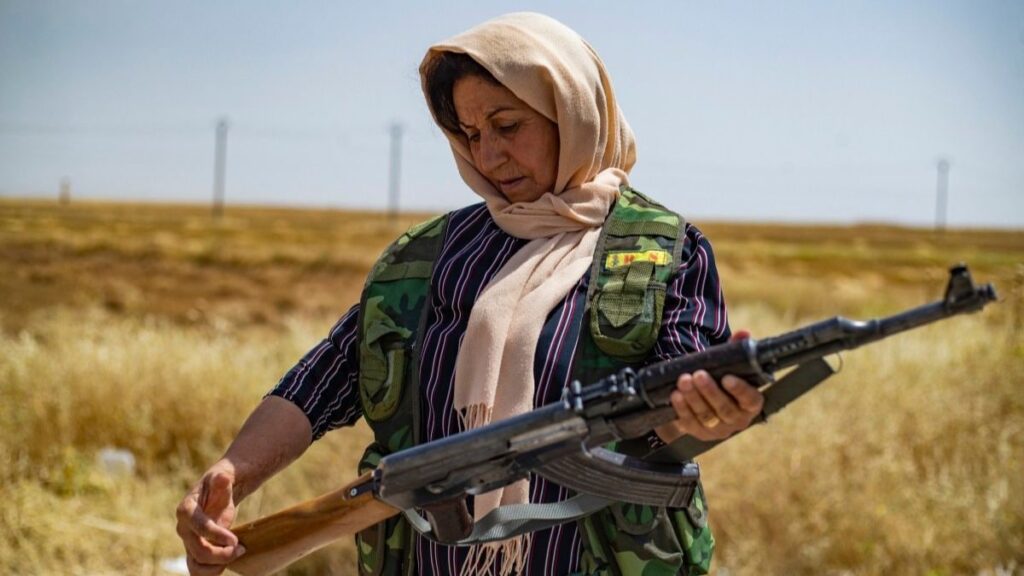Volunteers from the Kurdish Community Protection Units check their rifles as they protect wheat fields from fire and looters around the town of Tarbesbeiyeh (also known as Al-Qahtaniya in Arabic) in Syria's northeastern Hasakeh province near the Turkish border, on May 30, 2024. AFP
With a weapon in one hand and adjusting her scarf with the other, Yasmine Yousef patrols one of Syria's vast wheat fields, a vital source of income for the country's grain belt.
The 42-year-old is one of dozens of volunteers, some of them women, helping the Kurdish-led semi-autonomous region protect fields near Qahtaniya from fires and arson.
“Our mission is to serve farmers and protect their crops,” Yousef said, adding that the work will last for a month or two.
“In case of a fire we will be notified directly and we will call the fire engine,” she told AFP.
Farmers in northeastern Syria are expecting an exceptionally good harvest this year after heavy rains following years of drought.
But residents also worry that wildfires, which occur every summer, could destroy valuable crops.
According to a recent World Bank report, “Agricultural production recovered in 2023 due to improving weather conditions after hitting near-record lows the previous year.”
“Official statistics suggest that the wheat harvest is expected to double to 2 million tonnes in 2023,” the report said.
In June 2019, wheat fields in the area were engulfed in flames, killing at least 10 people fighting the blaze, according to the Syrian Observatory for Human Rights war monitor.
At first, “people didn't believe us. They said, 'What are those women doing?'” Yousef says.
“Now we all agree that we need to come together to protect the land,” she said.
“People are totally dependent on this harvest. If we lose it, our lives will be worse off.”
– Strategic Assets –
Nearby, farmers worked in the scorching heat to till their golden fields, and Kurdish police patrolled the area.
Wheat in northeast Syria is a strategic asset for the semi-autonomous government, providing bread for the people living in the region.
Every year, the Syrian government and the regime, which accuses the Kurds of separatism, compete to buy the wheat harvest from farmers.
Residents and officials in the Kurdish-controlled area told AFP they believed the fires were likely the result of arson.
Islamic State militants have previously burned crops in Kurdish-controlled areas after the U.S.-backed Syrian Democratic Forces, the region's Kurdish de facto army, expelled them from the last Kurdish-held territory in Syria in 2019.
Volunteer Renkin Hassan, 50, urged people not to throw away cigarettes which could accidentally start a fire, but also accused unspecified parties of “deliberately burning the land”.
“We won't let them do that,” she said defiantly, wearing a military vest, as she patrolled alongside other armed volunteers.
“I don't own even an acre of land, but I come here every day to help farmers harvest their crops without worrying about fire,” she added.
Local authorities say there have been several limited fires already this year.
The volunteers endure high summer temperatures and occasional surprise attacks by ISIS militants and Turkish military attacks targeting the SDF.
Armed with an assault rifle, flip-flops and a floral dress, Atia Hassan, 50, said her goal was to stop arsonists “from burning our land and to protect ourselves”.
“People are happy when they see us and we are proud of the effort we put in despite all the difficulties,” she added.
![]()
Find us on YouTube
subscribe
Source link



